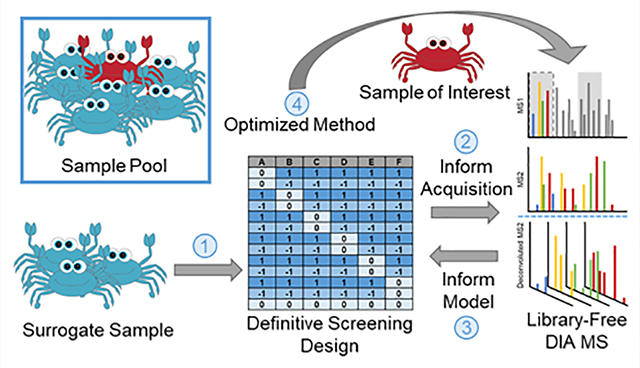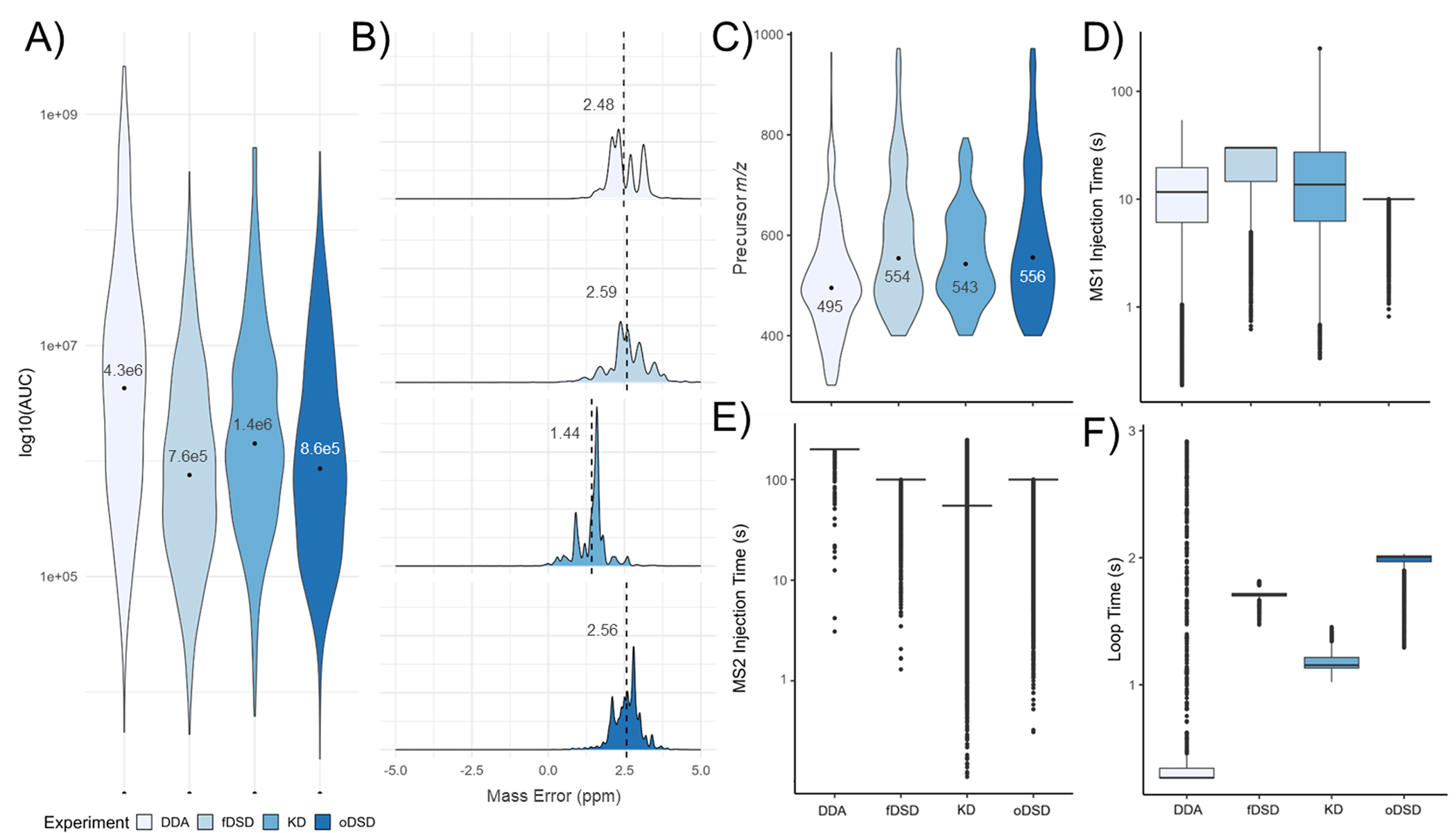Definitive Screening Design for Library-Free DIA-MS
Definitive Screening Design for Library-Free DIA-MS is an innovative Data-Independent Acquisition (DIA) strategy that combines a Library-Free analysis approach with the Definitive Screening Design (DSD) experimental strategy to enhance the analytical power of proteomics research. Traditional DIA-MS methods rely on preconstructed spectral libraries for protein identification, whereas Library-Free DIA-MS overcomes this limitation by directly interpreting sample-derived data, thereby improving data applicability and coverage. The DSD method further optimizes experimental design by reducing confounding effects among variables and improving the reliability of protein identification and quantitative analysis.
Compared to traditional Data-Dependent Acquisition (DDA) and spectral library-based DIA, Definitive Screening Design for Library-Free DIA-MS enables more comprehensive protein detection, making it particularly suitable for complex samples and low-abundance protein analysis. This approach is widely applied in biomarker discovery, disease research, drug development, and synthetic biology, providing researchers with more precise data support.
MtoZ Biolabs provides high-quality Definitive Screening Design for Library-Free DIA-MS services that utilize high-resolution mass spectrometry platforms and optimized DIA-MS strategies to deliver flexible and efficient proteomics solutions, ensuring data integrity, accuracy, and reproducibility.
Analysis Workflow
1. Sample Preparation and Quality Control
Upon receiving client samples, we conduct preliminary quality control to ensure they meet the requirements for high-throughput DIA-MS analysis. Proper sample preparation is essential for ensuring the success of subsequent analysis.
2. DIA-MS Data Acquisition
Using high-resolution mass spectrometry instruments, we perform data acquisition with Library-Free DIA-MS technology to obtain comprehensive protein information while applying Definitive Screening Design to optimize experimental variables.
3. Data Processing and Quality Control
After data acquisition, we implement strict quality control and preprocessing steps to remove noise and optimize the data, ensuring the accuracy of subsequent analysis.
4. Data Analysis and Report Delivery
We conduct in-depth data analysis using bioinformatics tools and provide detailed reports, including protein quantification, differential analysis, and functional annotation.

Phetsanthad, A. et al. J Proteome Res. 2023.
Applications
Definitive Screening Design for Library-Free DIA-MS is widely used in proteomics and biomedical research, providing accurate protein data for various fields.
1. Biomarker Discovery
Library-Free DIA-MS enables high-throughput screening and quantitative analysis, improving biomarker discovery.
2. Disease Mechanism Research
Applied to cancer, neurodegenerative, and cardiovascular diseases, this method analyzes disease-related protein dynamics and provides insights into molecular mechanisms.
3. Drug Development and Target Identification
In drug development, Library-Free DIA-MS enables comprehensive target analysis, refining selection strategies.
4. Synthetic Biology and Protein Engineering
This method supports novel protein function studies, aiding protein engineering and enhancing synthetic protein design.
5. Clinical Proteomics Research
With high-throughput quantitative analysis, Library-Free DIA-MS facilitates precision medicine and the clinical application of proteomics data.
Case Study
Case 1: Enhancing Neuropeptide Identification with Definitive Screening Design for Library-Free DIA-MS
This case study demonstrates how Definitive Screening Design (DSD) optimizes Library-Free DIA-MS analysis to improve neuropeptide identification and quantification. By systematically optimizing multiple mass spectrometry parameters using the DSD method, researchers significantly enhanced the detection sensitivity and reproducibility of low-abundance neuropeptides.
The optimized DIA-MS workflow successfully identified 461 neuropeptide fragments from limited sample conditions, achieving significantly improved identification coverage compared to traditional DDA and DIA methods. This approach eliminates the reliance on preconstructed spectral libraries, making it particularly suitable for low-abundance molecule analysis, especially in disease sample biomarker detection, providing a more precise tool for neuropeptidomics research.

Phetsanthad, A. et al. J Proteome Res. 2023.
FAQ
Q1: Can the DSD method be applied outside of proteomics research?
Definitive Screening Design (DSD) is not limited to proteomics; it can also be applied in metabolomics and other fields for experimental optimization. It effectively identifies key variables influencing experimental outcomes, improving data acquisition stability and accuracy. MtoZ Biolabs’ Definitive Screening Design for Library-Free DIA-MS services can provide customized optimization strategies tailored to different research needs, ensuring high-quality data and experimental efficiency.
Q2: Are special preprocessing steps required for FFPE samples?
Due to protein crosslinking and degradation in formalin-fixed paraffin-embedded (FFPE) samples, which affect protein extraction and analysis, special preprocessing steps are required before Library-Free DIA-MS analysis. MtoZ Biolabs employs optimized protein extraction and de-crosslinking techniques, including heat-induced epitope retrieval (HIER) and specialized enzymatic digestion strategies, to enhance protein recovery rates and ensure the accuracy of downstream DIA-MS analysis.
In the era of highly complex and dynamic proteomics research, Definitive Screening Design for Library-Free DIA-MS is not merely a combination of technologies but a methodological innovation. MtoZ Biolabs integrates experimental design, artificial intelligence, and mass spectrometry technologies to offer full-cycle solutions, from method development to biological insights.
Whether you are exploring functional proteins in unknown species or addressing the challenges of low-abundance biomarker detection in clinical translation, we provide verifiable data quality, transparent optimization processes, and responsive scientific support, making us your trusted research partner. Contact us to learn more!
How to order?







